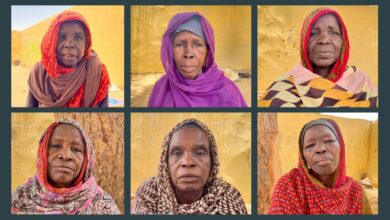Mobs Overrun Streets, After Mass Lynching Of Police Officers In Nigeria
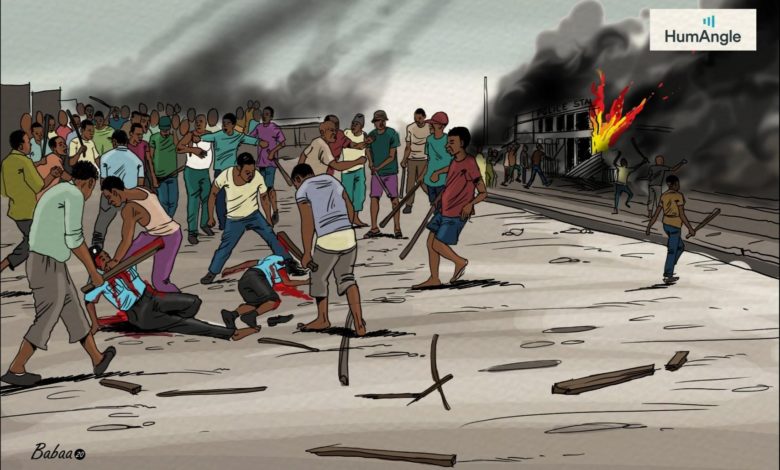
The two-week epic youth-led protests against police brutality that recently raged across Nigeria have morphed into cruel acts of aggression against the institution of the police and many of its members. This is, however, not getting enough attention despite foreseeable adverse consequences.
The demonstrations started on Thursday, October 8, triggered by videos circulated on social media that showed highhandedness and extrajudicial killing by officers of the disbanded Special Anti-Robbery (SARS) Squad.
For the next two weeks, protests were held in various states across the country and by Nigerians in the diaspora calling for police reforms and an end to brutality. But before long, groups of hoodlums seized the opportunity to unleash staggering violence on members of the police force.
The Nigeria Police Force is an agency established by law to preserve public order, enforce the law, protect lives and properties as well as prevent and investigate crime. Ideally, the institution plays a vital role in the administration of justice by detecting, apprehending and bringing criminals to justice according to the laws of the land.
Many in the police feel they are under siege by criminals to the seeming applause of an indifferent public. Following the widespread attacks of their stations, a marked absence of policemen in the streets in various states was noticed by Nigerians.
The looting of warehouses where COVID-19 palliatives were kept, burgling of private residences and shops were recorded across the country towards the tail end of the #EndSARS demonstrations and immediately after. Officers of the Nigerian military had to be deployed in some of the affected areas to prevent further breakdown of law and order.
Contrary to Inspector-General of Police Muhammed Adamu’s directive last week, the police were yet to fully return to the streets of Abuja and Lagos five days after the #EndSARS protests ended, which encouraged looting and arson to spread widely.
Speaking with Channels Television on Thursday, Presidential Spokesperson Femi Adesina described the lootings as “pure criminality” promoted by near anarchy.
“What has happened in the past two or three weeks or thereabout led to what is happening now. If there was cohesion and tranquillity in the society, this wouldn’t happen, ” Adesina said.
“If you didn’t have people burning police stations, killing policemen, burning private and public property, you wouldn’t have this spate of looting. That means those same people would be in society and would find a way to eke out a living,” he said.
The police count their losses
According to the Police boss, Adamu, through the Police Spokesman, Mr Frank Mba, “available reports show that twenty-two (22) police personnel were extra-judicially killed by some rampaging protesters and scores injured during the protests. Many of the injured personnel are in life threatening conditions at the hospitals.”
Mba added that “two hundred and five (205) police stations and formations, including other critical private and public infrastructure, were also damaged by a section of the protesters.
“Despite these unprovoked attacks, our police officers never resorted to use of unlawful force or shooting at the protesters,” Mba said. He chided human rights organizations to continue to solely blame the police for everything that went wrong without paying tribute to police officers who were gruesomely murdered during the protests while serving the fatherland.
From Lagos to Anambra, Ekiti, Oyo, Rivers and Edo states, policemen were mobbed, killed and maimed by hoodlums who could only be stopped by the institution they were targeting. The police came under attack by an unruly army of youths and other innocent law-abiding citizens who relied on the police became helpless as they watched the looting and destruction of their private properties.
In Rivers State, three policemen, Insp. Sunday Dubon, Sgt. Swawale Ornan, and Sgt. Umunna Uchechukwu lost their lives to angry mobs. Three police stations were also burnt to the ground in the state.
Uchechukwu was butchered, his legs and hands cut off, and his body was eventually burnt to ashes. Emotionally stricken by the presence of the grieving wives and children of the murdered policemen, the Governor of Rivers State, Mr Nyesom Wike, vowed to subdue the secessionist group, Indigenous People of Biafra (IPOB), which according to him masterminded the massacre against policemen across the state.
He announced that the State Government had decided to pay the sum of N20 million to each of the families of those killed by hoodlums in Oyigbo.
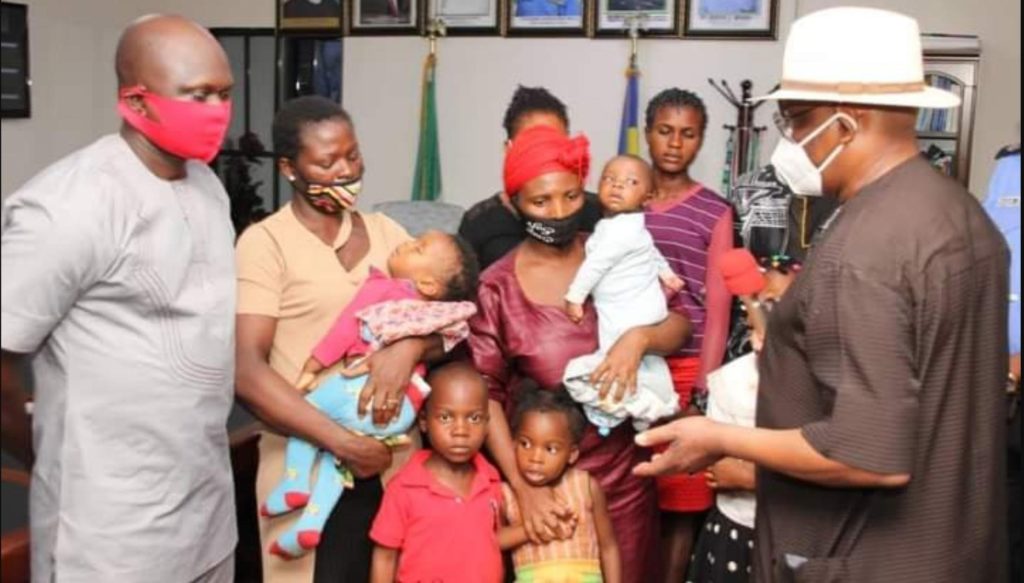
In Oyo State, records show that four policemen were killed, namely, Sgt. Ajibola Adegoke, Cpl. Rotimi Oladele, Insp. Abegunde Peter, and Insp. Alidu Yusuf.
The massacre of policemen in Enugu witnessed a devastating spike with the hoodlums reportedly killing, roasting and eating the flesh of a policeman in public. Jesse John, who hailed from the Magami Area in Taraba State capital, Jalingo, was burnt along with his car by hoodlums.
The mass destruction and killings were much worse in Lagos, where the state government had to impose a curfew to keep the situation under control.
Six police officers were reported killed in the course of their duty in the state. They include ASP Yard Edward attached to Denton Police Station, Insp. Olayinka Erinfolami of defunct Anti Kidnapping Unit, Insp. Adegbenro Aderibigbe attached to Meiran Division, Sgt. Abejide Abiodun of the Department of Operations, and two other officers attached to Orile Division.
A source within the state’s Mobile Police unit, however, informed HumAngle that the casualties were deliberately underreported.
Equally, in the state, 16 police stations were set ablaze while 13 others were vandalised by hoodlums.
Fifty-eight (58) police vehicles were burnt and 13 vandalised. Additionally, 62 vehicles belonging to private individuals and those connected with some pending cases (exhibits) were burnt and nine others vandalised by the hoodlums.
In Edo State, seven police stations were burnt while the #EndSARS protests lasted and an unconfirmed number of police officers were killed. The razed stations include those located in Ugbekun, Idogbo, Ikpoba, Evbotubu, Ivbiotor, Textile Mill Road, and Oba Market.
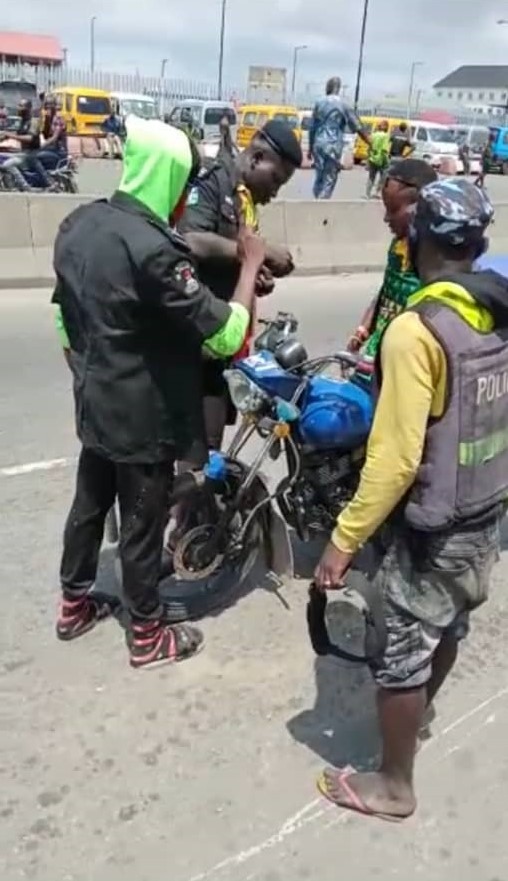
Police officers cry out
According to a senior police officer who said he had never been assigned to the SARS unit in his over 20 years of service, “the appalling brutalities against our colleagues were perpetrated by criminals to the unfortunate applause of law-abiding public who are constitutionally, legally and legitimately reliant on the police to maintain law and order.”
The officer who does not want his name mentioned, added that well-meaning Nigerians must protect the force for the police to be able to protect them. “This is the ideal and practical civilian-police relationship every civilized society, desirous of building and maintaining a secure and crime-free society maintains,” he concluded.
Several policemen who spoke to HumAngle said they remained traumatised by the overwhelming brutality policemen across the country faced. They said the silence over the vengeance against the police would dampen the morale of the average operative in a very long time.
The officers blamed criminals for leading the herd that attacked hundreds of policemen in several parts of the country.
“These criminals tactfully infiltrated the genuine, well-meaning protesters and unleashed terror on the police by slaying and maiming policemen in the most brutal and dehumanising manner and razing down police stations and police vehicles,” said a top cop in Abuja during interaction with HumAngle.
Police Commissioners in about five states have revealed the names of the police casualties, but some of the officers claimed that the figures released by the inspector-general were “conservative” and that so many more were maimed, with several police stations burned down.
The Executive Secretary of the National Human Rights Commission (NHRC), Tony Ojukwu Esq, while reacting to the civil attacks against the police in Abuja on Thursday, condemned the widespread killing of police officers across the country.
Ojukwu said the attacks on police personnel, arson and destruction of police facilities or those of other agencies were clearly out of place and should be condemned totally by well-meaning Nigerians and urged the police not to be deterred from carrying out their duties diligently and professionally, despite the recent provocations by some misguided members of the society.
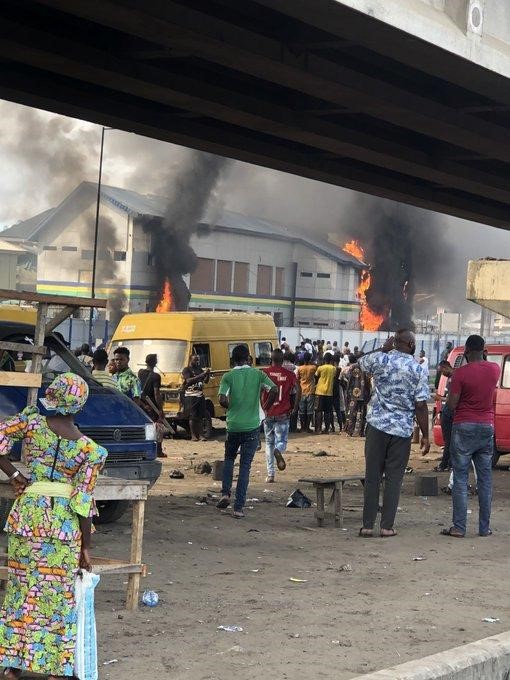
The bastardisation of the police institution
The systematic neglect and abuse of Nigeria’s justice system by successive generations of bad leaders since the country’s independence in 1960 gave Nigerians a policing system that relies heavily on extortions rather than subvention to support its operations. This has not only rendered the police ineffective but robbed them of credibility from the people they ought to protect.
According to a report by Human Rights Watch (HRW) released in August 2010, corruption in the public sector affects the proper functioning of the security infrastructure and the protection of lives and property.
“The embezzlement of vast amounts of public funds destined for the police force indirectly impacts Nigerians’ enjoyment of human rights protections by limiting the capacity of the police to conduct criminal investigations and provide protection from violence and other forms of crime,” the report noted.
“Left with limited investigatory capacity and forensic laboratories in disarray, the Nigerian police routinely resort to extortion in part to fund basic police services, and to torturing criminal suspects as their primary tool for collecting evidence.”
Since the Nigeria Police Force was established in 1930, it has gained a reputation for engaging in unprofessional, corrupt, and criminal conduct. Over the years, no leader devoted time and resources to reform Africa’s largest yet one of the most unaccountable police sectors.
However, HRW added in its report, that many Nigerian “police officers conduct themselves in an exemplary manner, working in difficult and often dangerous conditions.”
Sadly, 90 years after its birth, the police institution is viewed more like a group of predators than protectors, and the “Nigeria Police Force has become a symbol in Nigeria of unfettered corruption, mismanagement, and abuse,” HRW noted.
Despite the problems associated with the police as an institution and the fact that the men and women in the service are victims like any other Nigerian subjected to decades of bad governance, when the police withdrew from the streets in several states to escape mobs, the country experienced looting, vandalism and arson on a scale never seen in recent years.
Support Our Journalism
There are millions of ordinary people affected by conflict in Africa whose stories are missing in the mainstream media. HumAngle is determined to tell those challenging and under-reported stories, hoping that the people impacted by these conflicts will find the safety and security they deserve.
To ensure that we continue to provide public service coverage, we have a small favour to ask you. We want you to be part of our journalistic endeavour by contributing a token to us.
Your donation will further promote a robust, free, and independent media.
Donate Here


